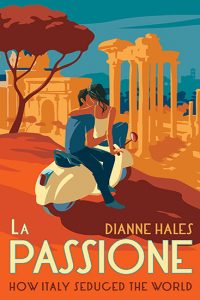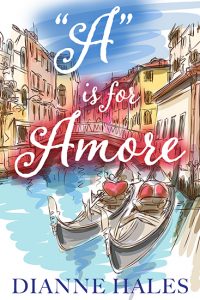
One summer night on the island of Capri some friends told us to meet them at a popular restaurant at precisely 9:35 p.m. When we arrived at the bustling eatery, they escorted us away from the crowded main dining room to a quiet alcove and insisted that Bob and I take the two chairs looking toward the sea. As if on command, una luna rossa (a red moon) rose majestically from the sea to shine upon the faraglioni, the mammoth rock formations that heave out of the water like relics of a primeval ruin. Scientists explain this dazzling sight as un’illusione ottica (an optical illusion) that occurs when the moon is low on the horizon–the same reason that the sun may appear red as it sets.
The moon’s magic has inspired classic romantic songs in English, such as “Moon River” and “Moon Glow.” Italian has its own word for moonlight: gibigiana (spelled in various ways, including gibigianna), defined as a “balenìo di luce riflesso dall’acqua o da uno specchio” (flash of light reflected from water or from a mirror). Considered old-fashioned and little used in modern times, it dates back to the fairy tales grandmothers (nonne) once told about a gianna (witch or fairy), a word derived from the goddess Diana, or a giubiana (ghost).
While gibigiana comes from the Lombard dialect, other regions use different expressions to capture this sparkling effect: fare specchietto (make a little mirror) in Lucca; bagliore (glimmer) in much of Romagna; indovinello or illuminello (riddle or puzzle) in Pisa and Livorno; la veccia (the old woman) in Piedmont; lo spirito folletto (the hobgoblin or elf) in Modena. Italian designers refer to a certain style of lamp as a gibigiana. Film-makers use the term for a device placed in front of a light source as a filter. In slang gibigiana colorfully describes a woman who dresses in a “flashy” style—glittery rather than elegant.
I enjoy every phase of the moon’s monthly dance across the sky — whether it’s new (nuova), waxing (crescente), full (piena) or waning (calante). But the moon doesn’t just appear in Italy’s night sky; it also lights up daytime conversations. A person with extravagant wishes is said to chiedere la luna (ask for the moon). Italians refer to a fetus as being ancora nel mondo della luna (still in the world of the moon or not yet born) Some folks are so absentminded or detached from reality that they seem to vivere nel mondo della luna (live in the world of the moon). Others are in such bad moods that they avere la luna storta (have the crooked moon). In hard times people find themselves struggling to sbarcare il lunario (make ends meet).
An Italian lunatico may be temperamental but isn’t necessarily as wacky as an English lunatic. But do watch out for anyone who tries to fare vedere la luna nel pozzo (make you see the moon in a well). He’s just stringing you along. And you certainly don’t want to end up doing as the local dogs do: abbaiare alla luna (barking at the moon — or exerting yourself in vain).
Dianne Hales is the author of LA BELLA LINGUA: My Love Affair with Italian, the World’s Most Enchanting Language; LA PASSIONE: How Italy Seduced the World; MONA LISA: A Life Discovered; and “A” Is for Amore, which you can download for free at diannehales.com.







